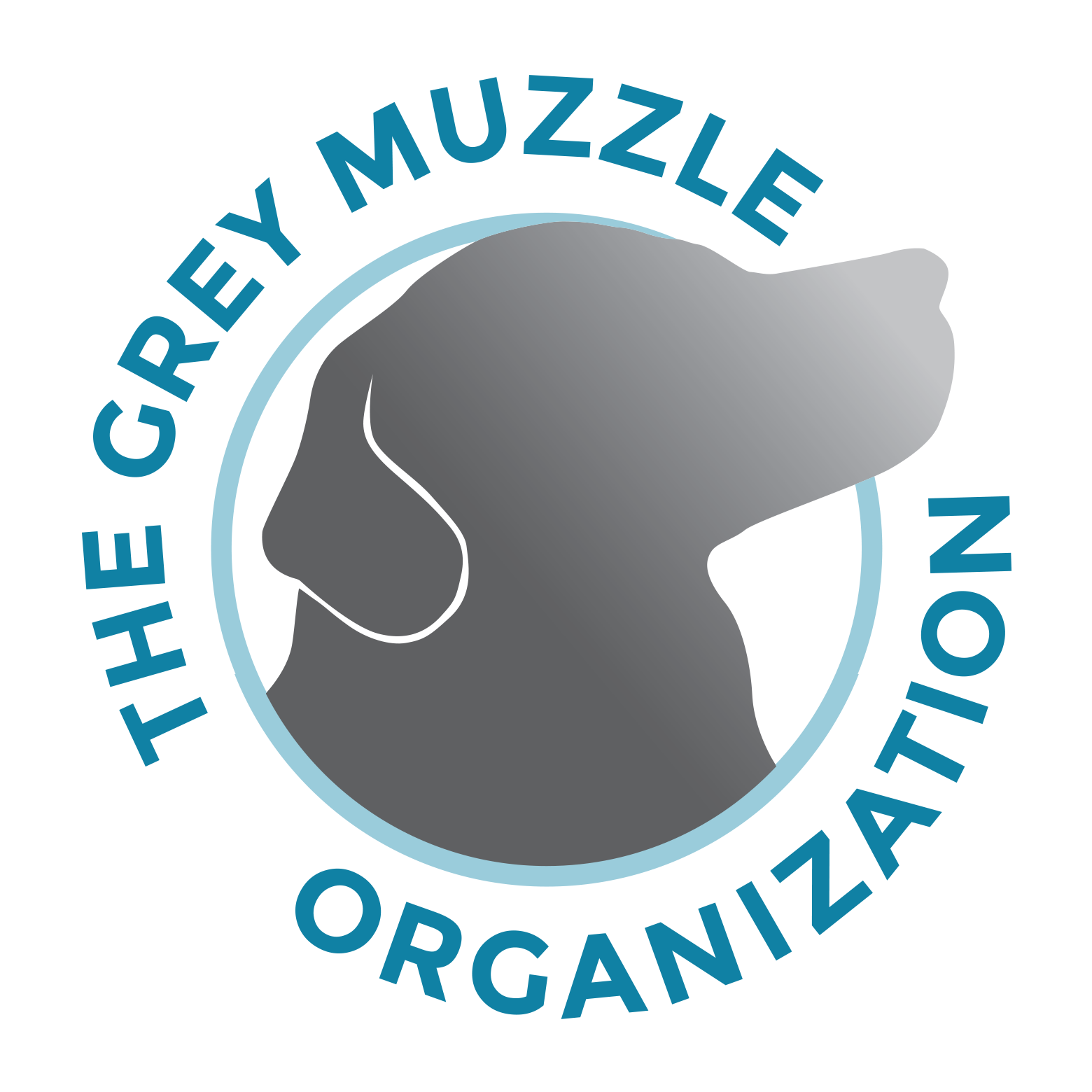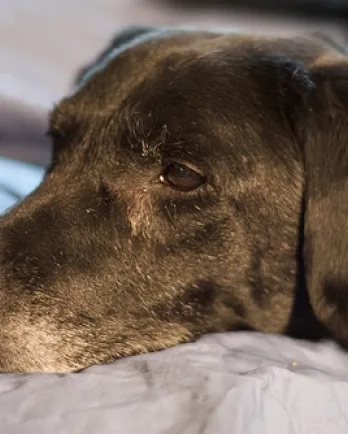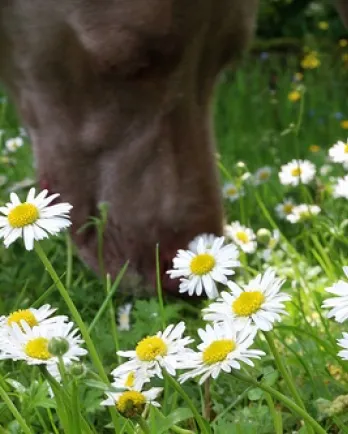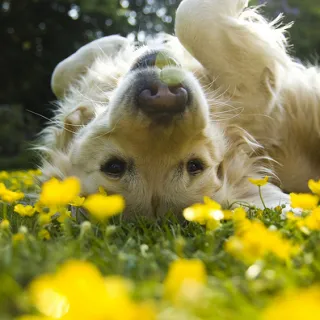Coping with Pet Illness and Loss by Doug Koktavy
This post is excerpted from "Strategies to Cope with Caregiver Suffering" by Doug Koktavy, which can be found in its entirety, along with other resources, in Your Dog's Golden Years: A Manual for Senior Dog Care, edited by Jennifer Kachnic. Doug Koktavy is the best-selling author of The Legacy of Beezer and Boomer: Lessons on Living and Dying from My Canine Brothers and a certified counselor for the Association for Pet Loss and Bereavement.
I used to think grieving was something that began after a loved one passed. So when my 9-year-old Labrador retriever Beezer was diagnosed with kidney disease, it never occurred to me to seek out emotional help for myself during his illness. I could have used it. Beezer was dying, but I was drowning in fear and guilt—fear of what lay ahead when the illness worsened and guilt about my possible neglect in caring for him. Only later did I learn my condition had a name: anticipatory grief.
Anticipatory grief: The normal mourning that occurs when a patient or family is expecting a death. Anticipatory grief has many of the same symptoms as those experienced after a death has occurred. It includes all of the thinking, feeling, cultural and social reactions to an expected death that are felt by the patient and family.
People can go through anticipatory grief when pets are dying as well. Today, we are just beginning to understand the scope of the malady related to our own companion animals.
For me, when Beezer was dying, confusion and difficulty completing tasks were a surprising additional result. As an attorney, running my own practice out of my home, I prized myself on being highly organized, practical and in control. But from the day Beezer was diagnosed, fear and guilt had all the control. It was in; I was out.
Handling Fear and Guilt
Saying that I had a difficult time managing my emotions is an understatement. I was so afraid of losing him, yet over the months that followed, no matter how hard I tried—strict diets, at-home IV treatments, vet visits— I couldn’t keep the disease from claiming my pet. Looking back, so much of that journey was consumed by fear. I felt immense fear over what was to come and fear for what my life would be like after Beezer passed. I also felt guilt over my inability to control the outcome. I was used to getting my way by simply working harder; now I had no weapons that worked.
During the time between his diagnosis and our final goodbye, Beezer became my teacher. He and I came to explore the nature of fear and guilt and together we developed strategies to cope. We even learned how to enjoy each day together. But it didn’t come easy.
Through this relationship, I came to see that my two biggest problems were deeply tied to time—the past, present and future. I would second-guess and relive past decisions I made on the dog’s behalf, under the various headings of:
“Why didn’t I try this before? If only I had _____.”
And, my personal favorite: “It’s my fault because ______.”
These episodes were my ego talking to me, I know that now; not then. My ego was infecting me with guilt over something that happened earlier. I decided that to feel guilty is nothing more than to live in the past.
Moreover, to live in fear is to always live in the future. When this all started happening, the dogs would watch in silent amazement as I rushed about, obsessing over things that hadn’t even happened yet. “How much time do we have together?” “What if ____ happens next week?” “Beezer won’t even get to celebrate his tenth birthday...”
The problem with this thinking was that my fixation over the future had caused me to ignore today. The key, I finally realized, was to somehow avoid living in both the past and the future. This was presence. Presence is simply living in the moment. This proved to be easier said than done. Anticipatory grief had me in its clutches.
How do you deal with anticipatory grief? First is to acknowledge that the emotions you are going through are normal and can be alleviated. Everyone handles loss differently. Since there were no books back then on dealing with anticipatory grief when a pet is dying, I created my own strategies using what I knew and was familiar with. You may have others.
I came up with three strategies during these trying days.
Strategy #1: The Daily Appreciation
Talking really helps. Beezer, his sibling Boomer and I would gather on the bed and have a nightly discussion. I called them The B Brothers. Each exchange was different yet the same. I’d start with telling them how much they meant to me and how lucky I was to have them in my life. Sometimes we’d talk about fun times. Sometimes we’d talk about the difficult times. I’d explain the illness and my inability to change the outcome. I’d ask for input on how to spend what time we had left together.
Later, as Beezer’s time was drawing near, I told him he had my permission and blessing if he wanted to transition on his own. I didn’t want him pushing beyond his time because of my selfish needs of wanting to keep him around. I also realized that Beezer might prefer to pass on his own, out of my presence. Of course, that could mean I might come home one day and find that my buddy had left. I decided we needed to talk about that as well. I didn’t want any unfinished business or regret after it was too late to say a bit more.
Above all, we always ended on a positive note by expressing our mutual love and deep appreciation for each other. I’d then immediately turn out the lights. I found these discussions of great comfort and continued them with Boomer after Beezer passed and later with my new Lab, Coral.
Strategy #2: Permanent Time-Out
The disease was part of our lives. I couldn’t change that. I couldn’t pretend the illness wasn’t here. I had to deal with it, but I needed a way to relate to the disease on terms I could understand. I decided to give the disease a character.
I found an old plastic kiddie chair. I wrote “Kidney Disease Time-Out Chair” on a piece of paper and glued it to the chair. I placed the chair in a prominent place in my house where I could see it often. I then invited the disease to stay, have a seat, but informed it that there were going to be several rules:
- The disease could never again speak to me without my permission. The disease could hold up signs like, “Can I scare you today?” but planting words in my head was out.
- The disease could stay in our lives as long as it wanted, but it was restricted to the permanent time-out chair. Beezer and I were busy enjoying today and would try to make time for the disease later. So just sit tight and we’ll get back to you.
- The disease had to wear pink fuzzy slippers. Nothing on this planet is scary when sitting on a kiddie chair wearing pink fuzzy slippers. You play your games, I’ll play mine.
I found the strategy helpful. The fact that the chair was out in the open was especially powerful because it reinforced my ability to control fear on a daily basis. Once, when I felt I was becoming anxious again, I composed myself and announced in a stern voice, “WHO SAID YOU COULD LEAVE THE TIME-OUT CHAIR?” It worked. I giggled and both my dogs smiled.
Strategy #3: The Daily Point
Well, Beezer passed on, but he left behind a legacy of wisdom with the first lesson being how to live in the moment. The next year, Boomer was diagnosed with bone cancer along with kidney disease. This time I wasn’t going to let anticipatory grief undo me. This time my strategy was to remain present by developing a game. Having played ice hockey all my life and being a sports addict, I relish games where scores are kept and winners and losers are determined. Boomer was my equal when it came to fun and games. Our new game was called the Daily Point. Here’s how it worked.
Every day, one single point was up for grabs. Either our team, Boomer and I, would get the point or “Team Fear” (now with a second kiddie chair—for the monsters of kidney disease and bone cancer) would get the point. One point each day. There weren’t ties and we never had overtime.
Each morning Boomer and I would discuss how we were going to win today’s point. We usually came up with something we’d do together. Nothing else mattered. Even on the bad days, we’d stubbornly refuse to give in to fear for the simple reason that we didn’t want to lose today’s point. We became experts at enjoying today and never looked further than how to win “the point.”
Of course, each journey is unique to the human and the animal. You should follow your instinct and always do what you think is best. What worked for me is nothing more than what worked for me.
Please be kind to yourself and enjoy today with your pet. You’ll treasure this most special time for the rest of your life. I think you’ll find the best part of your humanity comes forward when your animal becomes ill and you are powerless to change the outcome. We should all be so fortunate to receive such love at the end of our lives.
You can read the entirety of the article "Strategies to Cope with Caregiver Suffering" by Doug Koktavy inYour Dog's Golden Years: A Manual for Senior Dog Care, edited by Jennifer Kachnic. Proceeds from the sale of Your Dog's Golden Years benefit The Grey Muzzle Organization.
The Grey Muzzle Organization improves the lives of at-risk senior dogs by providing funding and resources to animal shelters, rescue organizations, sanctuaries, and other nonprofit groups nationwide.




